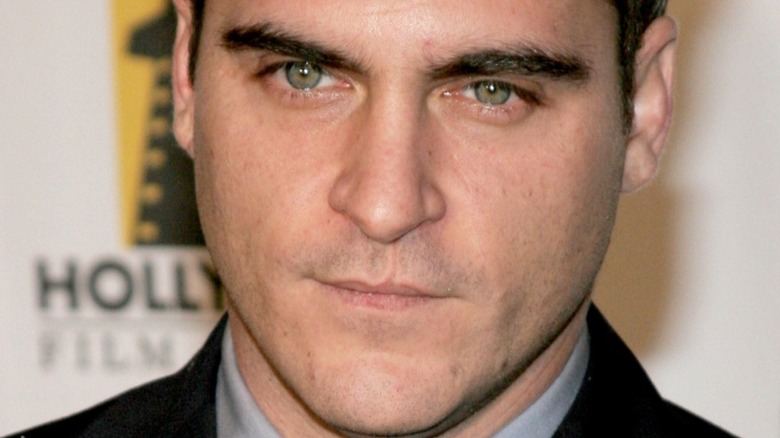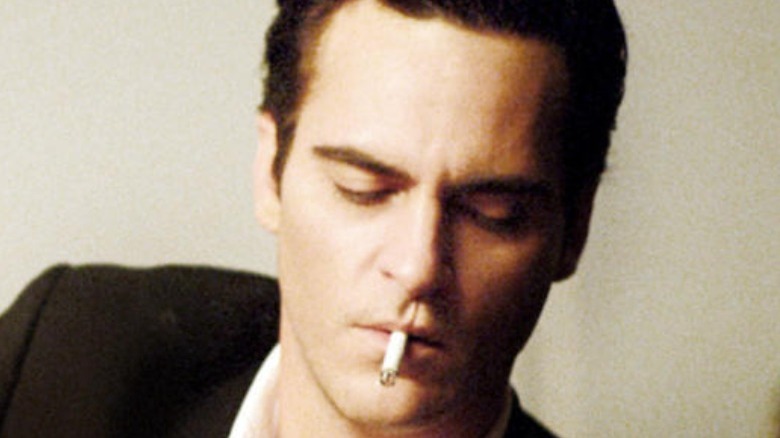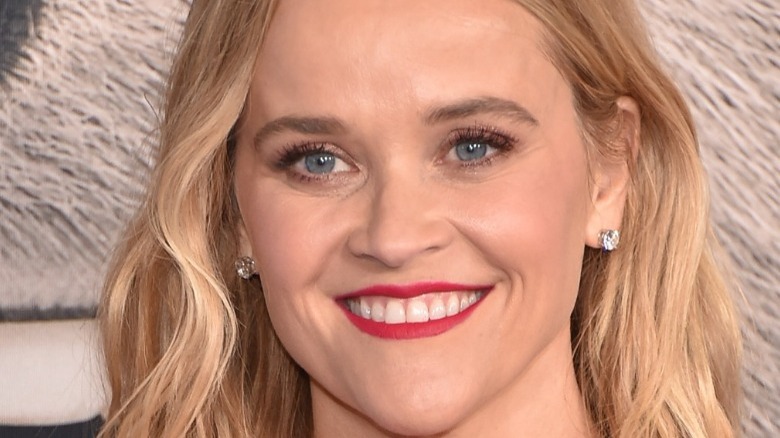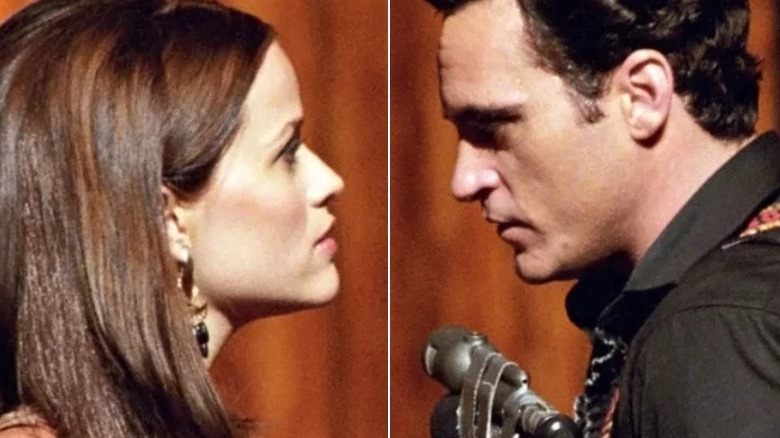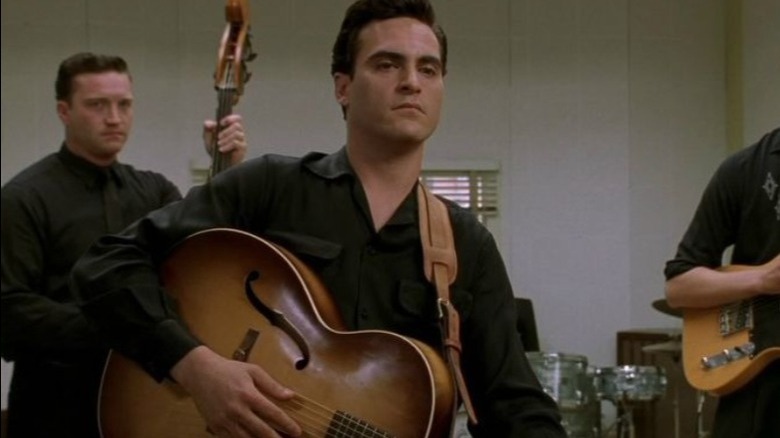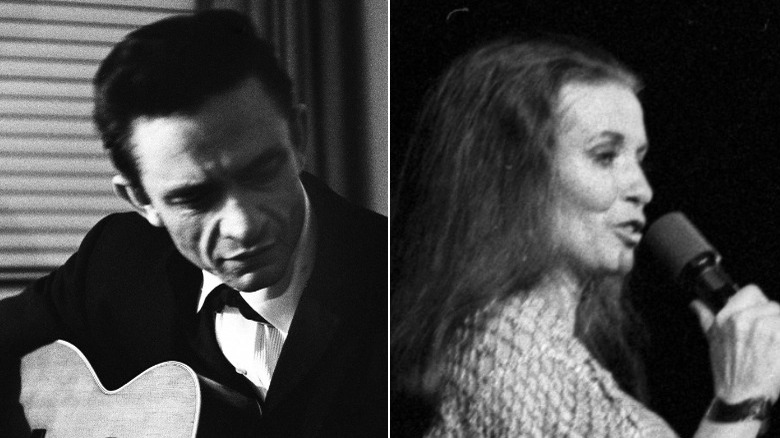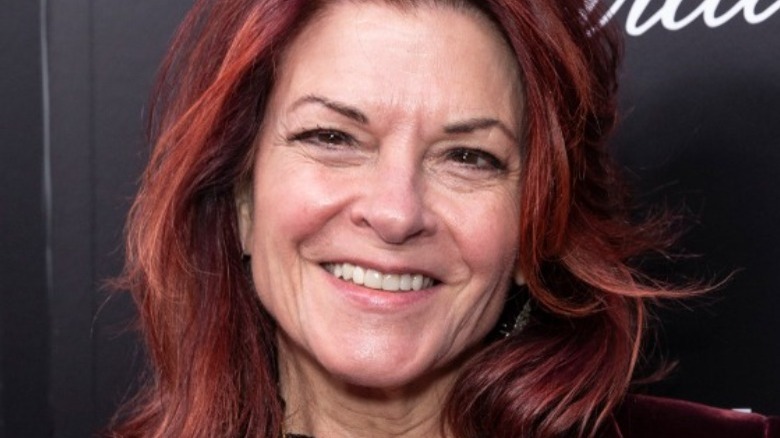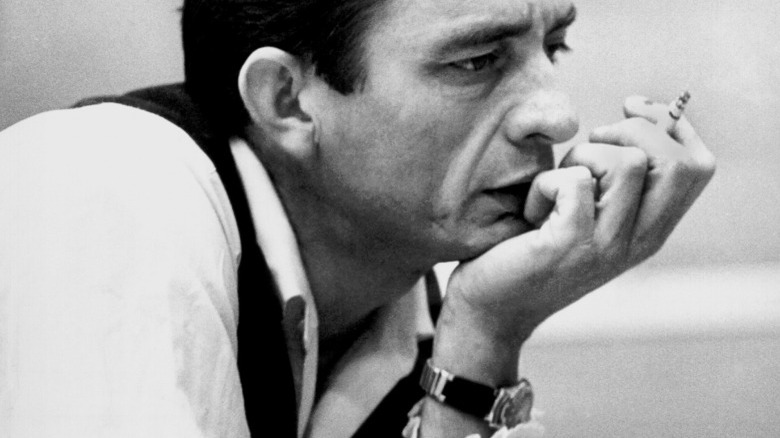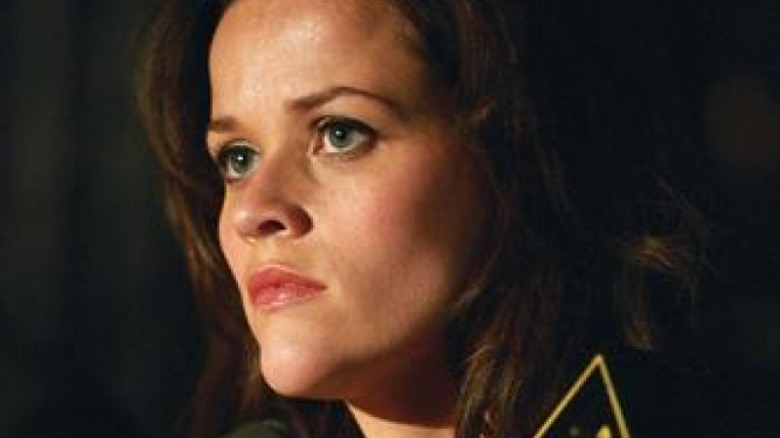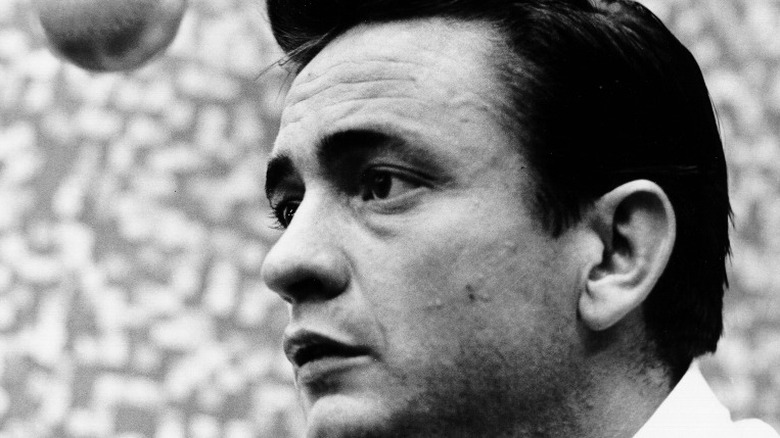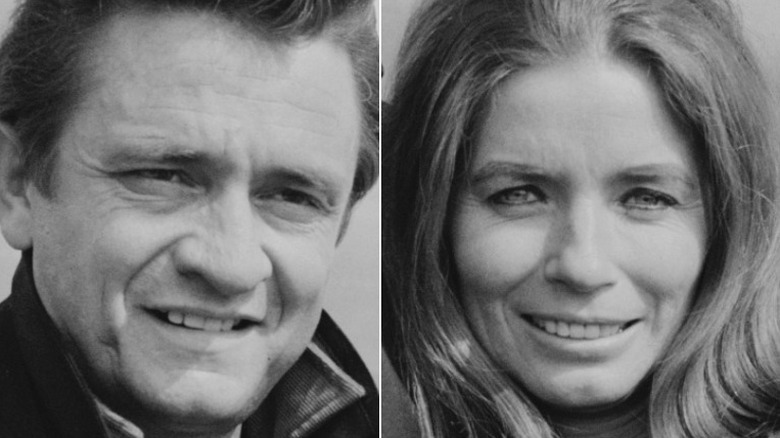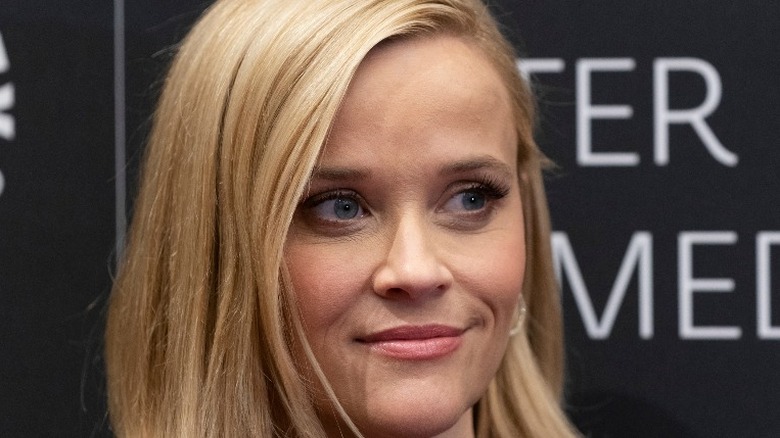The Untold Truth Of Walk The Line
We may receive a commission on purchases made from links.
When "Walk the Line" was released in 2005, the world learned that Joaquin Phoenix and Reese Witherspoon could sing. Both actors gave their all in stellar performances and proved they could carry multiple niches in feature films. The Johnny and June Carter Cash biopic showed great chemistry between Phoenix and Witherspoon and received a slew of award accolades, including a best actress Academy Award for Reese Witherspoon.
Johnny "The Man in Black" Cash broke new ground in country music, and his indomitable spirit influenced punk rock as well. While "Walk the Line" showcased the genius behind Cash's persona and music, it also painted a picture of one of the greatest love stories in the music world. The Cashes famously first met at the Grand Ole Opry in 1956, but both were married to other people. After their respective divorces, the couple fell in love and married in 1968. They went on to make music together and enjoyed a 35-year marriage, which produced one son, John Carter Cash.
"Walk the Line" gave audiences insight into the deep and profound love the Cashes shared, and Johnny Cash made numerous television and film appearances before his death — even appearing on a 1996 episode of "The Simpsons." Nonetheless, "Walk the Line" was the first fictionalized account of the couple's romance to hit the silver screen, and the behind-the-scenes stories from the film contain treasure troves of fascinating trivia. Let's take a look at some of those stories here.
Joaquin Phoenix wanted in before reading the script
By 2002, Joaquin Phoenix had riveted audiences and critics with his portrayal of the evil Commodus in "Gladiator" (2000) and as Mel Gibson's slacker brother, Merrill Hess, in M. Night Shyamalan's "Signs." Phoenix had acted on screen since childhood, often in strong supporting parts. However, before landing "Walk the Line," the actor hadn't scored a blockbuster lead role. Phoenix's singing skills were unknown, and although he could strum a few guitar chords, he had yet to perform musically on-screen. At 5 feet, 7 inches, Phoenix stood far shorter than Cash (who was 6 feet, 2 inches). Yet, the actor desperately wanted to play the country legend on the big screen.
Phoenix told ABC News, "I knew I wanted to do the movie without even reading the script." He continued, "I just had a good feeling about it." The actor's feeling paid off as "Walk the Line" raked in almost $186.8 million at the box office (via Box Office Mojo) and earned Phoenix his first best actor Academy Award nomination (Phoenix was nominated for a best supporting actor Academy Award in 2001 for "Gladiator"). Phoenix expanded on his process of embodying Cash to The Guardian, stating, "I think we have a sense of when something is authentic and when it isn't. With this part I didn't think I had to sound like Cash, but I certainly had to know how he felt when he was singing."
Witherspoon didn't think she would have to sing
By the time Reese Witherspoon snagged the role of June Carter Cash in "Walk the Line," she had already built an impressive silver screen resume. Witherspoon melted the hearts of Hollywood and audiences alike in her debut performance as Dani Trant in the 1991 family film, "The Man in the Moon," and she continued to work steadily throughout the 1990s and early 2000s. Witherspoon's A-list star status was cemented with leading roles in films like the fantasy "Pleasantville," Alexander Payne's black comedy "Election," and, of course, as Elle Woods in the successful 2001 flick "Legally Blonde," which went on to inspire a hit Broadway musical.
However, when it came to singing publicly, Witherspoon felt out of her element. Before "Walk the Line" was released in theaters, Witherspoon sat down with Oprah Winfrey to discuss her fears about singing. She told Oprah, "It was awful. First of all, we had to learn how to sing. ... I absolutely was just gobsmacked!" Witherspoon went on to joke, "Can't they call LeAnn Rimes? She's good! ... I'm just an actress!" Thankfully, by the time filming began, Witherspoon felt far more confident in her vocal abilities. After much hard work, the actress learned to sing like June Carter Cash — both she and Joaquin Phoenix took six months of vocal lessons with famed celebrity vocal coach Roger Love and music producer T-Bone Burnett. Reese Witherspoon went on to receive a bevy of accolades and awards for her performance.
The stars sang every song
Even in biopics where the lead actors sing, there are often portions of those films where the performers lip-sync. "Ray" and "Bohemian Rhapsody" are two examples of excellent movies with phenomenal leading performances that also include lip-syncing — the former used Ray Charles' master recordings for the film, while the latter piped in Freddy Mercury's actual vocals behind Rami Malek's stunning performance (via Metro US). Jamie Foxx and Malek both contributed vocals, but neither carried the entirety of the films' music with their own singing.
Yet in "Walk the Line," every featured vocal performance involving Johnny Cash and June Carter Cash is sung by Joaquin Phoenix and Reese Witherspoon (respectively). Phoenix, especially, captures the haunting quality of Cash's voice sans mimicking — he makes the vocals his own. The stars even performed in character in front of large crowds. In an Instagram post celebrating the 15th anniversary of "Walk the Line," Witherspoon remembers these concerts fondly, stating, "Despite all the practice, I was so nervous to sing in front of those huge crowds, but once we got started, it was such a thrill. Truly an unforgettable experience I will always cherish." The challenge of musical performances seemed to help forge the undeniable chemistry the two lead actors shared in the film.
Phoenix mastered the guitar
It's no small feat to pick up an instrument in adulthood, and it's extremely impressive to master said instrument in less than a year. In "Walk the Line," Joaquin Phoenix had to play guitar with some level of expertise; to strum "Hot Cross Buns" wouldn't exactly convey authenticity on-screen. Thus, the actor purchased a guitar, taught himself basic chords, and tried his hand at writing songs.
The lessons paid off, with Phoenix playing guitar in "Walk the Line" as if he'd played for years rather than months. The actor managed to sing like Cash as he played, earning rave reviews from critics. According to The Seattle Times, Phoenix spoke to The Associated Press about the experience. "It was real, real slow," he said. "It was like three kinds of phases of having to go back to stage one. ... You don't feel it's possible ... When I picked up that guitar, it felt so foreign to me." Phoenix exudes a passion for playing throughout the film — perhaps he wouldn't have captured Cash so well without falling in love with playing himself. After the film's completion, Phoenix even recorded a few songs with the British indie rock band The Charlatans.
Both Cashes approved of their on-screen counterparts
James Mangold, the director of "Walk the Line," held a deep love for his subject matter and wanted to make sure he captured the Cashes' story correctly. He told MTV News, "I was [a fan] long before I made the movie. I was a huge Johnny Cash fan from the time I was a kid." Mangold made sure that Cash approved of the "Walk the Line" casting choices. He went on to say that Cash "was thrilled" with the idea that Joaquin Phoenix would portray him. "John was a very trusting man," Mangold said. "He was very easygoing, a very cool guy. When you've got someone like Joaquin who, frankly, is very similar, a very cool actor, John knew that we were moving in the right direction." He explained that Cash loved "Gladiator" and was especially captivated by Phoenix's performance in the film.
According to the Grand Ole Opry, June Carter Cash also approved of the choice of Reese Witherspoon to portray her in her younger years. Witherspoon wanted to dive deep into the country maven's psyche and played her as a sassy and savvy performer with a sweet, compassionate heart. In an interview with IGN, Witherspoon said, "I think in a way, she was more open with [Johnny] than anyone she had ever met, because I think he understood her and her artistic talents in a way that she wasn't appreciated before."
Rosanne and Kathy Cash took issue with the film
Not everyone in the Cash family felt ecstatic about the on-screen depiction of their family in "Walk the Line." Rosanne Cash and Kathy Cash, Johnny Cash's daughters from his first marriage to Vivian Liberto, took issue with certain aspects of the movie. Neither daughter cared for the portrayal of their mom or her marriage to their father. Kathy Cash, the second of Cash's four daughters with Liberto, objected to and walked out of a private screening of the film. She didn't take issue with the performances of Phoenix and Witherspoon and thought that, as a whole, the film was well done. However, she felt her mother was painted in a negative light. Kathy said that her mom always supported her dad's career but had problems with her husband's growing drug addiction. The marriage of Johnny Cash and Vivian Liberto lasted for 13 years.
Rosanne Cash, a famous country singer in her own right, chose not to attend the "Walk the Line" premiere but did watch the film before its theatrical release. She told The Harvard Crimson that the movie dug up difficult memories. She said, "The movie was painful, because it had the three most damaging events of my childhood: my parent's divorce, my father's drug addiction, and something else bad that I can't remember now."
If you or anyone you know is struggling with addiction issues, help is available. Visit the Substance Abuse and Mental Health Services Administration website or contact SAMHSA's National Helpline at 1-800-662-HELP (4357).
Cash had a passionate faith not shown in the film
While "Walk the Line" rightly focused on the help June Carter gave her soon-to-be husband in kicking his drug addiction, the Christian faith Johnny Cash leaned on didn't play a leading role in the movie. Wider audiences may have found specific faith conversations off-putting, so Cash's love of God didn't play a predominant role in the film. Nonetheless, it drove much of Cash's life and his love for June Carter Cash. It makes sense that James Mangold chose not to focus on this aspect of the life of the "Man in Black," but Cash deeply believed in the religion's message of redemption.
In 2005, The New York Times spoke with Patrick Carr, the co-author of Johnny Cash's 1997 autobiography, about the singer's deep faith and the lack of its influence over the film. In life, the country star often spoke of his faith and even saw the catalyst of his sobriety as part of God's plan. Cash appeared at famous evangelist Billy Graham's crusades and openly credited God for his life, love, and success if asked. He saw the story of the Christian gospel as one for outcasts in need of redemption and grace. The omission didn't take away from the powerful story shared in "Walk the Line," but devoting a bit more on-screen time to Cash's faith would have painted a fuller picture of the star's personality.
If you or anyone you know is struggling with addiction issues, help is available. Visit the Substance Abuse and Mental Health Services Administration website or contact SAMHSA's National Helpline at 1-800-662-HELP (4357).
Witherspoon learned how to rock the autoharp
Before Reese Witherspoon starred in "Walk the Line," she had never played an instrument. Alas, she had to learn to play June Carter Cash's instrument of choice — the autoharp — with no prior instrument training. Although the autoharp is often picked up by elementary school students, it hasn't played a prominent feature in most popular musical acts. In 2008, singer-songwriter Basia Bulat made an entire album utilizing the autoharp, but the instrument hasn't received a lot of fanfare on the popular music scene before or since. Nonetheless, June Carter Cash made the autoharp sound beautiful.
Just as Phoenix learned to play guitar, Witherspoon became a proficient autoharp player. The actress plays all required autoharp riffs in "Walk the Line." In an interview with LiveAbout, Witherspoon showed her good humor about the experience, stating, "The singing part was easier for me than the autoharp part. Playing the instrument was really difficult for me. I had never played an instrument. I don't know how that even happens to people."
Brother Jack's death haunted Cash
Johnny Cash's older brother, Jack, really did die tragically at 14 years old. His death played out very similarly to its depiction in "Walk the Line," but Jack actually lingered with severe injuries for a week before he died. Cash, who was especially close to his older brother, took his death extremely hard. He carried the guilt of being unable to convince Jack to go fishing instead of working that day (thereby leaving him unable to help prevent the accident) with him throughout his life.
In his memoir, "Cash: The Autobiography," the country superstar was candid about how much he missed his brother, stating, "Jack was my big brother and my hero: my best friend, my big buddy, my mentor, and my protector. We fit very well, Jack and I; we were very happy together. I loved him. I really admired him, too. I looked up to him and I respected him. He was a very mature person for his age, thoughtful and reliable and steady. There was such substance to him — such seriousness, if you like, or even moral weight, such gravitas ... Putting it in today's terms, he gave me unconditional love." Cash went on to confess, "It was awful at the time and it's still a big, cold, sad place in my heart and soul."
Neither Cash lived to see the film
Before "Walk the Line" debuted in theaters on November 18, 2005, both Johnny and June Carter Cash died. June Carter Cash left this world first, passing away on May 15, 2003. She was 73 years old. The love of her life, J.R. "Johnny" Cash, followed shortly after, dying almost four months later on September 12, 2003. He was 71. The couple had signed off on James Mangold's film, which was in the early stages of pre-production before their deaths.
Sadly, Reese Witherspoon didn't have the chance to meet the icon whose presence she would capture so well on-screen. However, Phoenix dined with the Cashes a year and a half before the death of Johnny Cash. Cash was enamored with Phoenix after watching him in "Gladiator" and invited the actor to dinner at his home in Los Angeles. Phoenix later described the love he saw between Cash and his wife and the beauty of their music to The Orange County Register. "Music was his way of communicating," Phoenix said. "June walked into the room and sat beside him as he began singing 'On the Banks of the River Jordan.' It was an amazing experience to watch them sing that song. The level of emotion in that room was unbelievable. It was like no one else was in the room, and I was witnessing this incredibly intimate moment between two people."
Witherspoon loved her experience
"Walk the Line" solidified Reese Witherspoon as one of the best actresses in Hollywood. She'd earned credits in myriad excellent films before her Academy Award-winning role as June Carter Cash, but most featured Witherspoon playing either a teenager or young adult. Cash was a "grown-up" role, and with it, Witherspoon proved she had the chops to handle meatier, adult parts.
Witherspoon has since gone on to star in acclaimed films like 2014's "Wild" (for which she was nominated for a best actress Academy Award) and voiced Rosita in 2016's animated hit "Sing." Her star has shined in meaty television roles, too, playing Madeline on HBO's award-winning series "Big Little Lies" in 2017 and 2019 and as Bradley Jackson on Apple TV+'s "The Morning Show" (Witherspoon also served as Executive Producer for both shows). However, when given the chance, the actress still gushes about "Walk the Line." In her Instagram post celebrating the 15th anniversary of the film, Reese Witherspoon also shared via Instagram that the film was "truly an unforgettable experience I will always cherish."
Although many years have passed since "Walk the Line" hit the big screen, the film still holds up well. As a music biopic, it often ranks high on "top movies of the genre" lists and resonates with fans. Perhaps the behind-the-scenes stories added to the quality of the finished product.
